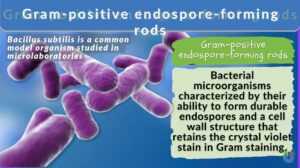Search Results for: gram-negative
Gram-negative
Definition adjective Of, or relating to the group of bacteria that take the color of the counterstain (i.e. pink) under the... Read More
Gram-positive endospore-forming rods
Gram-Positive Endospore-Forming Rods Definition Gram-positive endospore-forming rods are a group of rod-shaped bacteria... Read More
Eubacteria
Eubacteria are prokaryotic microorganisms consisting of a single cell lacking a nucleus and containing DNA is a single... Read More
Gram-indeterminate bacteria
Definition noun, singular: gram-indeterminate bacterium Bacteria that do not respond to gram staining and, therefore, are... Read More
Gram-positive bacilli
Definition noun, singular: gram-positive bacillus A group of rod-shaped bacterial cells that appears violet through Gram's... Read More
Gram-positive cocci
Definition noun, singular: gram-positive coccus A group of spherical bacteria that retains the violet stain following gram... Read More
Gram-positive bacteria
Definition noun, singular: gram-positive bacterium A group of bacterial cells that retains the violet colour following ... Read More
Gram staining
Definition noun A staining method performed to determine whether a bacterial species is gram-positive (i.e. violet stain) or... Read More
Anaerobic bacteria
Bacteria are classified according to the need for oxygen to survive and grow. For example, aerobic bacteria are bacteria... Read More
Cross-linking
Cross-linking Definition Cross-linking, in general, means the forming of cross-links between the joining structures. In... Read More
Aerobic bacteria
Aerobic Bacteria Definition What does aerobic mean in biology? As the name suggests, 'aerobe' in biology means organisms... Read More
Escherichia coli
Definition A Gram-negative, facultatively anaerobic, rod-shaped species belonging to the family... Read More
Middle lamella
Definition noun plural: middle lamellae ˈmɪdəl ləˈmɛl.ə A pectin-rich intercellular material that glues the... Read More
Secondary cell wall
Definition noun plural: secondary cell walls ˈsɛkənˌdɛɹi sɛl wɔːl The layer of the plant cell wall that forms... Read More
Primary cell wall
Definition noun plural: primary cell walls ˈpɹaɪməɹi sɛl wɔːl The layer of the plant cell wall that forms prior to... Read More
Differential stain
Definition noun The dye or stain that is used to differentiate one component or cellular structure from another, or to... Read More
Counterstain
Definition noun The dye or stain that is used to differentiate one component or cellular structure from another, or to... Read More
Facultative anaerobe
Facultative Anaerobe Definition What does facultative anaerobe mean? Facultative organisms are the most adaptable... Read More
Cell membrane
Cell Membrane Definition Just like any non-living body possesses a plastic or paper packaging material that keeps the... Read More
Prokaryote
Prokaryote refers to any of the group of living organisms primarily characterized by the lack of a true nucleus and other... Read More
Peptidoglycan
Definition noun, plural: peptidoglycans (1) A glycan (a polysaccharide) attached to short cross-linked oligopeptides in the... Read More
Cell morphology
The basic essence for any living organism is its structural framework which includes appearance, form, and the... Read More
Obligate aerobe
Before we define obligate aerobes, let us first understand and define aerobic organisms. Aerobic organisms are those that... Read More
Brevibacillus brevis
Definition noun A motile aerobic ellipsoidal spore forming rod organisms involved in gramicidin production an antimicrobial... Read More
Conjugation
Conjugation generally means the joining or coming together (union), such as in certain unicellular organisms (some bacteria,... Read More
Protoplasm
Protoplasm Definition The protoplasm is regarded as "the living material or the living content of a cell". It is fluid... Read More
Exogenous pyrogen
Definition noun, plural: exogenous pyrogen A type of pyrogen that is of microbial origin, such as the lipopolysaccharide in... Read More
Enterobacteriaceae
Definition noun: (taxonomy) A family of gram-negative bacilli that inhabit the large intestine of humans and other... Read More
Serratia marcescens
Definition Noun A gram-negative motile and non-endospore forming rod bacterium associated with hospital acquired infections... Read More
Antibiotic
Definition noun, plural: antibiotics Antimicrobial agent made from microorganisms, and can kill and inhibit the growth of... Read More
Transmembrane protein
Definition noun, plural: transmembrane proteins A protein that spans the entire biological... Read More
Unicellular
Unicellular organisms are organisms consisting of one cell only that performs all vital functions including metabolism,... Read More
Neisseria flavescens
Definition Noun A gram-negative saprophytic bacterium found normally in the nasopharynx, mouth and upper respiratory tracts... Read More


















